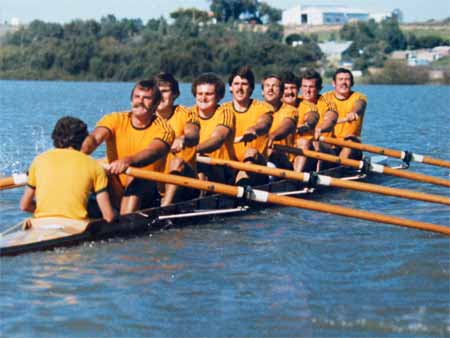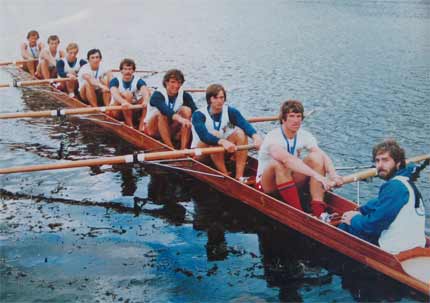History of Mercantile Rowing Club
Table of Contents
Chapters
- The River Yarra
- Early Rowing in Victoria
- The Beginnings (1880-1890)
- Mercantile in the Nineties (1890-1900)
- Sloan, Ivens and Fluctuating Fortunes (1900-1910)
- Dark Days and New Dawn (1910-1920)
- Years of Mixed Success (1920-1930)
- Through the Thirties (1930-1939)
- The Struggle for Survival (1939-1946)
- Building for Success (1946-1950)
- Mercantile to the Melbourne Olympics (1950-1956)
- Rowing to Rome (1956-1960)
- A Pink Cloud on the Horizon (1960-1965)
- The Storm and its Passing (1965-1966)
- A Clear Light Blue Sky (1966-1968)
- High Noon (1968-1970)
- A New Challenge (1970-1973)
- Fire and the Second Building Project (1973)
- Winds of Change (1973-1976)
- The Close of the Century (1976-1980)
- The Base for Success (1980-1984)
- Success (1984-1988)
- Oarsome Foursome (1988-1992)
- A Boathouse for the Best (1992-1996)
- The Rise of the Professional Coach (1996-2000)
- Golden Girls (2000-2005)
Appendices
21. The Base for Success (1980-84)
Chapter Twenty-One page 1 2 3 4 5
1980-81 season
The most significant event to mark the opening of Mercantile's next century of rowing was the Moscow Olympics in August 1980. Whilst this event was unfortunately marred by a United States led political boycott of the Olympics, Australian rowing sent it's best prepared team to date with Mercantile's Andrew Withers representing in the men's eight which finished fifth in the final. Another club member, David Palfreyman, coached the women's coxed four which was based around a Melbourne University combination.

1980 Olympic Eight
Cox: David England, Str: Brian Richardson, 7: Tim Young, 6: Jim Lowe, 5: Tim Willoughby, 4: Andrew Withers, 3: Islay Lee, 2: Stephen Handley, Bow: Bill Dankbaar
The story of how Australian rowing under Australian Rowing Council President and Mercantile member Bob Aitken withstood Government pressure to boycott the Games, is a key chapter in the history of the sport. The work of other key ARC officials such as John Coates, John Boultbee and Chris Dane was excellent. The crews were on their flight to Europe when the decision to allow them to compete was announced. The pilot was provided with the news and announced this to the passengers with the words: How good is your Russian? The team erupted with joy.
Andrew Withers was the first Mercantile Olympic representative since David Douglas in the Mexico eight of 1968. Mercantile rowers would be included in every Olympic team from 1980 to the date of this history in 2005. Whilst this can be attributed to the increased size of the rowing team due to extra and regular funding by the Australian Government and the Australian Olympic Committee; the changes initiated by Mercantile in this quadrennium also established this continuous representation.
Under Captain Andrew Guerin and Chairman of Selectors David Douglas, the season was very successful for the Club being named as the Champion Club of Victoria and also lightweight premiers. Perhaps more significant was the recruiting of many coaches and rowers who were to become leaders in the sport.
The successful lightweight season was organised by one of these new coaches, namely Noel Donaldson. His programme was based around two good lightweights in Jim Adams and Martin Owen with Martin Owen taking the Captain's Trophy with his many successes. His coaching skills were tested with others in the group such as the Captain, but he managed to even get him across the line first on occasions.
Another new coach was Brian Richardson, who the Captain had determined should take over the senior ranks in following years. Brian agreed to take an under 19 crew in the domestic season in preparation. The Captain had recruited a lightweight crew of Greg Pechan, Derek Mollison, Joe Joyce and Ian McLean. Three of this crew would go onto race for Australia. The crew finished second to a composite Mercantile crew at the National Championships comprising club members Graham Barns, Glenn Deag, Sam Patten and coach Michael Manley. This crew was selected to represent Australia at the World Junior Championships and finished fourth. This was the best international regatta result for Australian rowing in 1981. Graham and Sam represented their country in senior rowing with Sam becoming a world champion.
Other future great rowers who started this season were Mark and David Doyle who won a maiden pair in the winter regattas and two more early in the season with Brian Doyle coaching them. Later in the season David was to be selected in the Victorian eight in what must one of the greatest rises to fame in Victorian rowing history. Mark also won youth four races for Mercantile later in the season whilst still at school. David was later to be an Olympic medallist and Mark a world champion.
The junior ranks, in those days represented those who had not yet won senior races rather than under 19 and was very strong. They were coached by Peter Philp and John Nickson. They won many club and championship events during the season, The group included key administrators of the future such as David Pincus and Jeff Lawrence as well Victorian representative rowers in Ian Belot, Stuart Moreton, Michael Sim and John Sabljak. David Watson and Cam Hall joined with Sabljak, Belot and Sim to take the National Championship junior four.

1981 Champion Junior Eight
Bow: David Pincus, 2: Jeff Lawrence, 3: Andrew McDonald, 4: John Sabljak, 5: David Watson, 6: Stuart Moreton, 7: Cam Hall, Str: Ian Belot, Cox: Michael Sim
Whilst the Victorian State Championships in January 1981 gave the club little success at a senior level, the Club was well represented in the King's Cup eight with Alex Sloan , Andrew Withers, Ion Popa, first year school leaver in David Doyle and John Leeming, formerly of Sydney Rowing Club. The Victorian men's youth eight contained Sam Patten, Glenn Deag (reserves), Martin O'Halloran and Mark Doyle with Graeme Barns coxing the boat. All these rowers would go onto row with distinction with Martin O'Halloran also being Captain. Club member Adrian Maginn, now coaching at MUBC, was in charge of the crew. The Kings Cup crew finished a canvas behind the South Australian eight who recorded their first win in this event for 44 years. The youth eight finished third. Lyall McCarthy was selected in the state lightweight four which finished second.
Mercantile was to record national championship wins in the senior coxless four rowing composite with MUBC; in the club junior four, the club youth four and in the FISA junior four rowing composite with MUBC and Corio Bay.
Also after the Nationals of 1981, Ian Belot was selected in the under 23 national team whilst Mike Sim was selected to cox the Australian four at the World Championships held in Munich. This crew finished sixth in the A final. David Palfreyman coached the national women's pair from MULRC.
Vic Ronai-Horvath and Kevin Wickham coached several successful novice and lightweight maiden crews which included future noted members in Tim Frederico, John Grant, David Aitken and Doug Scown.
Off the water, the Centenary celebrations went very well. A portrait of our President by noted artist Robert Hannaford was unveiled, 300 people attended a celebratory dinner at Leonda in Hawthorn along with many interstate rowing dignatories, a history of the Club was published, a centenary regatta was conducted with a new perpetual Centenary Cup presented and a group of older member even visited Henley on the Thames.
The social function highlights were the Christmas party and a Henley party on the Alma Doepel care of David Boykett.
Ted Sorani. Warwick Hutchins, Cesar Sanchez, David Hume, Ken Hume and Andrew Guerin and others repaired the boat trailer which was badly damaged in February 1980. Ted Sorani was awarded the Cooper trophy with his many endeavours for the Club.
It was a great season for the club.
